BMSK6006: Emotional Intelligence Skills for the Workplace Essay
VerifiedAdded on 2022/10/01
|25
|7322
|147
Essay
AI Summary
This essay delves into the multifaceted realm of emotional intelligence (EI) within the context of the modern workplace, particularly focusing on the Tesco, United Kingdom. It commences by establishing the fundamental concept of EI as the ability to perceive, control, and evaluate emotions, highlighting its increasing significance in today's dynamic business environment. The essay then meticulously explores the importance of developing EI, emphasizing its crucial role in enhancing leadership skills, managing diverse workforces, and fostering positive workplace cultures. Furthermore, the essay introduces mindfulness-based approaches as effective strategies for cultivating EI, detailing the benefits of mindfulness in improving social relationships, promoting resilience, and enhancing overall well-being. It concludes by discussing practical ways to implement mindfulness in the workplace, including aligning the approach with business strategies and fostering a culture of support and engagement. This comprehensive analysis provides valuable insights into the transformative potential of EI in driving individual and organizational success.
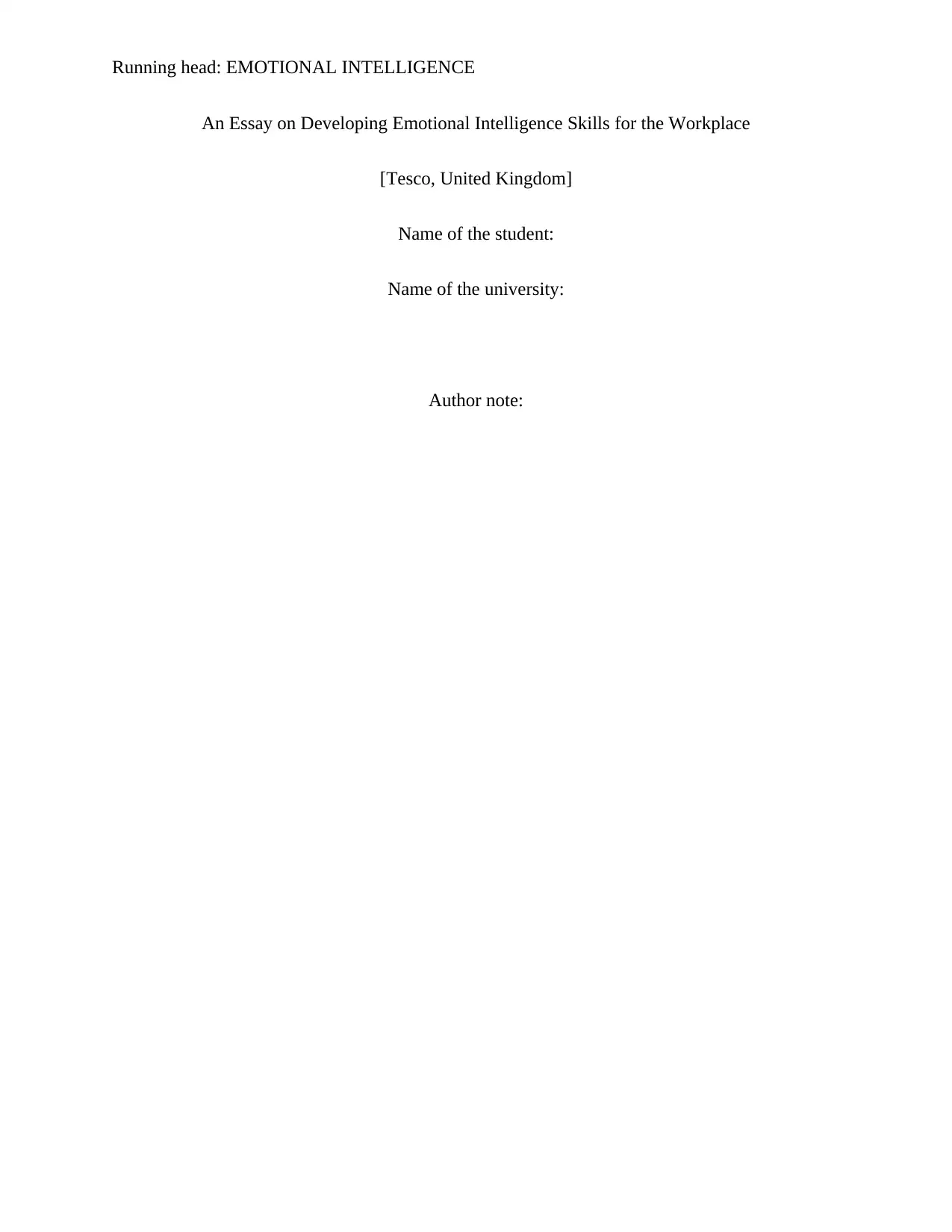
Running head: EMOTIONAL INTELLIGENCE
An Essay on Developing Emotional Intelligence Skills for the Workplace
[Tesco, United Kingdom]
Name of the student:
Name of the university:
Author note:
An Essay on Developing Emotional Intelligence Skills for the Workplace
[Tesco, United Kingdom]
Name of the student:
Name of the university:
Author note:
Paraphrase This Document
Need a fresh take? Get an instant paraphrase of this document with our AI Paraphraser
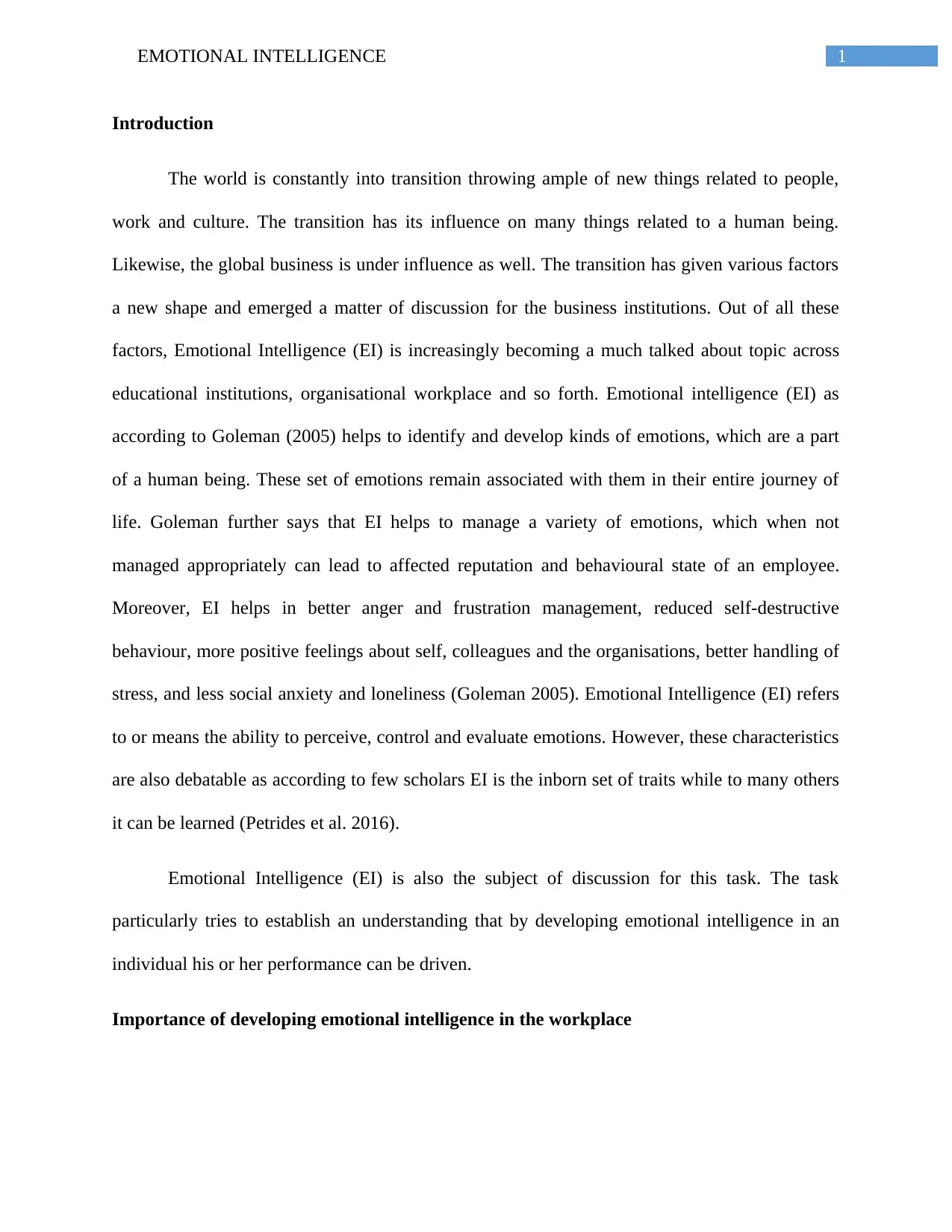
1EMOTIONAL INTELLIGENCE
Introduction
The world is constantly into transition throwing ample of new things related to people,
work and culture. The transition has its influence on many things related to a human being.
Likewise, the global business is under influence as well. The transition has given various factors
a new shape and emerged a matter of discussion for the business institutions. Out of all these
factors, Emotional Intelligence (EI) is increasingly becoming a much talked about topic across
educational institutions, organisational workplace and so forth. Emotional intelligence (EI) as
according to Goleman (2005) helps to identify and develop kinds of emotions, which are a part
of a human being. These set of emotions remain associated with them in their entire journey of
life. Goleman further says that EI helps to manage a variety of emotions, which when not
managed appropriately can lead to affected reputation and behavioural state of an employee.
Moreover, EI helps in better anger and frustration management, reduced self-destructive
behaviour, more positive feelings about self, colleagues and the organisations, better handling of
stress, and less social anxiety and loneliness (Goleman 2005). Emotional Intelligence (EI) refers
to or means the ability to perceive, control and evaluate emotions. However, these characteristics
are also debatable as according to few scholars EI is the inborn set of traits while to many others
it can be learned (Petrides et al. 2016).
Emotional Intelligence (EI) is also the subject of discussion for this task. The task
particularly tries to establish an understanding that by developing emotional intelligence in an
individual his or her performance can be driven.
Importance of developing emotional intelligence in the workplace
Introduction
The world is constantly into transition throwing ample of new things related to people,
work and culture. The transition has its influence on many things related to a human being.
Likewise, the global business is under influence as well. The transition has given various factors
a new shape and emerged a matter of discussion for the business institutions. Out of all these
factors, Emotional Intelligence (EI) is increasingly becoming a much talked about topic across
educational institutions, organisational workplace and so forth. Emotional intelligence (EI) as
according to Goleman (2005) helps to identify and develop kinds of emotions, which are a part
of a human being. These set of emotions remain associated with them in their entire journey of
life. Goleman further says that EI helps to manage a variety of emotions, which when not
managed appropriately can lead to affected reputation and behavioural state of an employee.
Moreover, EI helps in better anger and frustration management, reduced self-destructive
behaviour, more positive feelings about self, colleagues and the organisations, better handling of
stress, and less social anxiety and loneliness (Goleman 2005). Emotional Intelligence (EI) refers
to or means the ability to perceive, control and evaluate emotions. However, these characteristics
are also debatable as according to few scholars EI is the inborn set of traits while to many others
it can be learned (Petrides et al. 2016).
Emotional Intelligence (EI) is also the subject of discussion for this task. The task
particularly tries to establish an understanding that by developing emotional intelligence in an
individual his or her performance can be driven.
Importance of developing emotional intelligence in the workplace
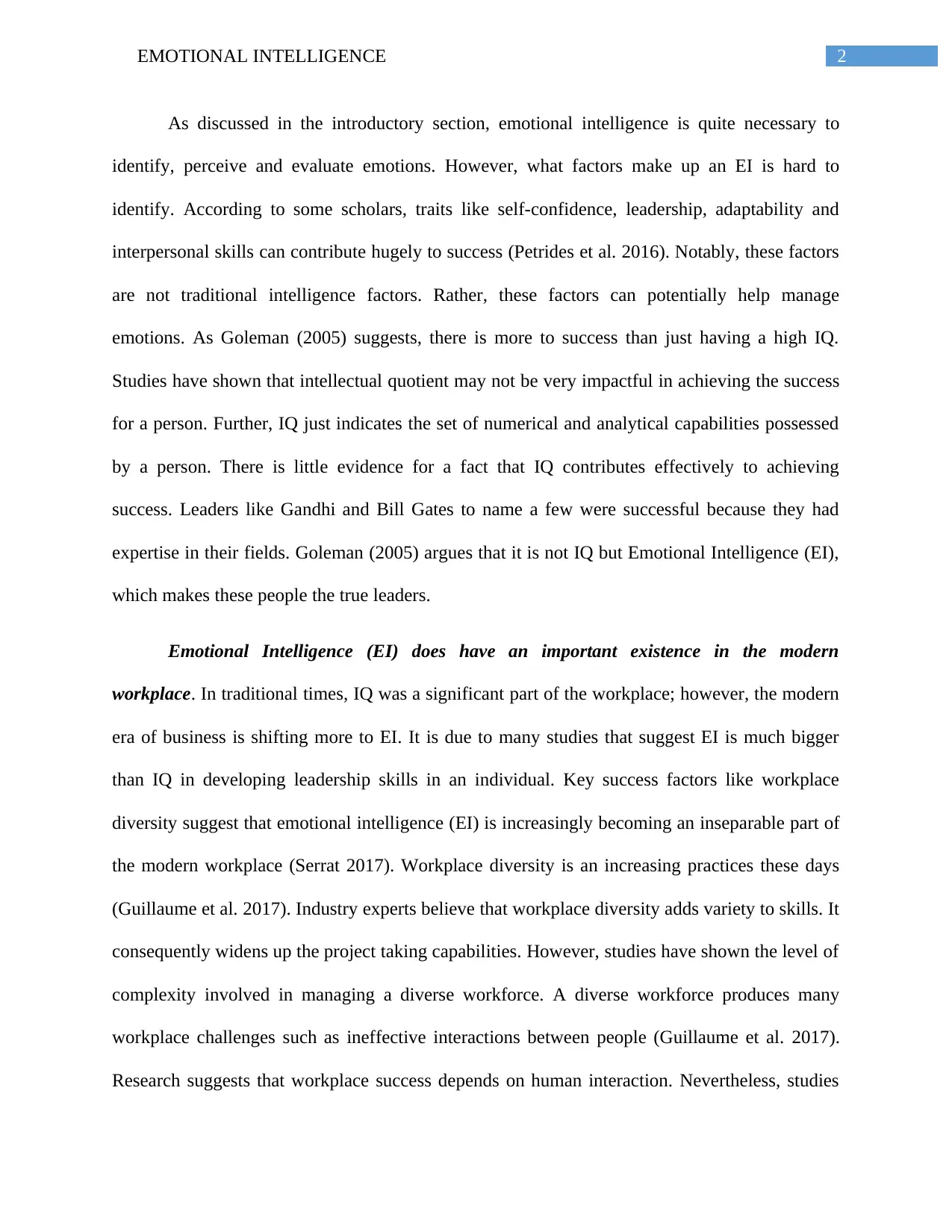
2EMOTIONAL INTELLIGENCE
As discussed in the introductory section, emotional intelligence is quite necessary to
identify, perceive and evaluate emotions. However, what factors make up an EI is hard to
identify. According to some scholars, traits like self-confidence, leadership, adaptability and
interpersonal skills can contribute hugely to success (Petrides et al. 2016). Notably, these factors
are not traditional intelligence factors. Rather, these factors can potentially help manage
emotions. As Goleman (2005) suggests, there is more to success than just having a high IQ.
Studies have shown that intellectual quotient may not be very impactful in achieving the success
for a person. Further, IQ just indicates the set of numerical and analytical capabilities possessed
by a person. There is little evidence for a fact that IQ contributes effectively to achieving
success. Leaders like Gandhi and Bill Gates to name a few were successful because they had
expertise in their fields. Goleman (2005) argues that it is not IQ but Emotional Intelligence (EI),
which makes these people the true leaders.
Emotional Intelligence (EI) does have an important existence in the modern
workplace. In traditional times, IQ was a significant part of the workplace; however, the modern
era of business is shifting more to EI. It is due to many studies that suggest EI is much bigger
than IQ in developing leadership skills in an individual. Key success factors like workplace
diversity suggest that emotional intelligence (EI) is increasingly becoming an inseparable part of
the modern workplace (Serrat 2017). Workplace diversity is an increasing practices these days
(Guillaume et al. 2017). Industry experts believe that workplace diversity adds variety to skills. It
consequently widens up the project taking capabilities. However, studies have shown the level of
complexity involved in managing a diverse workforce. A diverse workforce produces many
workplace challenges such as ineffective interactions between people (Guillaume et al. 2017).
Research suggests that workplace success depends on human interaction. Nevertheless, studies
As discussed in the introductory section, emotional intelligence is quite necessary to
identify, perceive and evaluate emotions. However, what factors make up an EI is hard to
identify. According to some scholars, traits like self-confidence, leadership, adaptability and
interpersonal skills can contribute hugely to success (Petrides et al. 2016). Notably, these factors
are not traditional intelligence factors. Rather, these factors can potentially help manage
emotions. As Goleman (2005) suggests, there is more to success than just having a high IQ.
Studies have shown that intellectual quotient may not be very impactful in achieving the success
for a person. Further, IQ just indicates the set of numerical and analytical capabilities possessed
by a person. There is little evidence for a fact that IQ contributes effectively to achieving
success. Leaders like Gandhi and Bill Gates to name a few were successful because they had
expertise in their fields. Goleman (2005) argues that it is not IQ but Emotional Intelligence (EI),
which makes these people the true leaders.
Emotional Intelligence (EI) does have an important existence in the modern
workplace. In traditional times, IQ was a significant part of the workplace; however, the modern
era of business is shifting more to EI. It is due to many studies that suggest EI is much bigger
than IQ in developing leadership skills in an individual. Key success factors like workplace
diversity suggest that emotional intelligence (EI) is increasingly becoming an inseparable part of
the modern workplace (Serrat 2017). Workplace diversity is an increasing practices these days
(Guillaume et al. 2017). Industry experts believe that workplace diversity adds variety to skills. It
consequently widens up the project taking capabilities. However, studies have shown the level of
complexity involved in managing a diverse workforce. A diverse workforce produces many
workplace challenges such as ineffective interactions between people (Guillaume et al. 2017).
Research suggests that workplace success depends on human interaction. Nevertheless, studies
⊘ This is a preview!⊘
Do you want full access?
Subscribe today to unlock all pages.

Trusted by 1+ million students worldwide
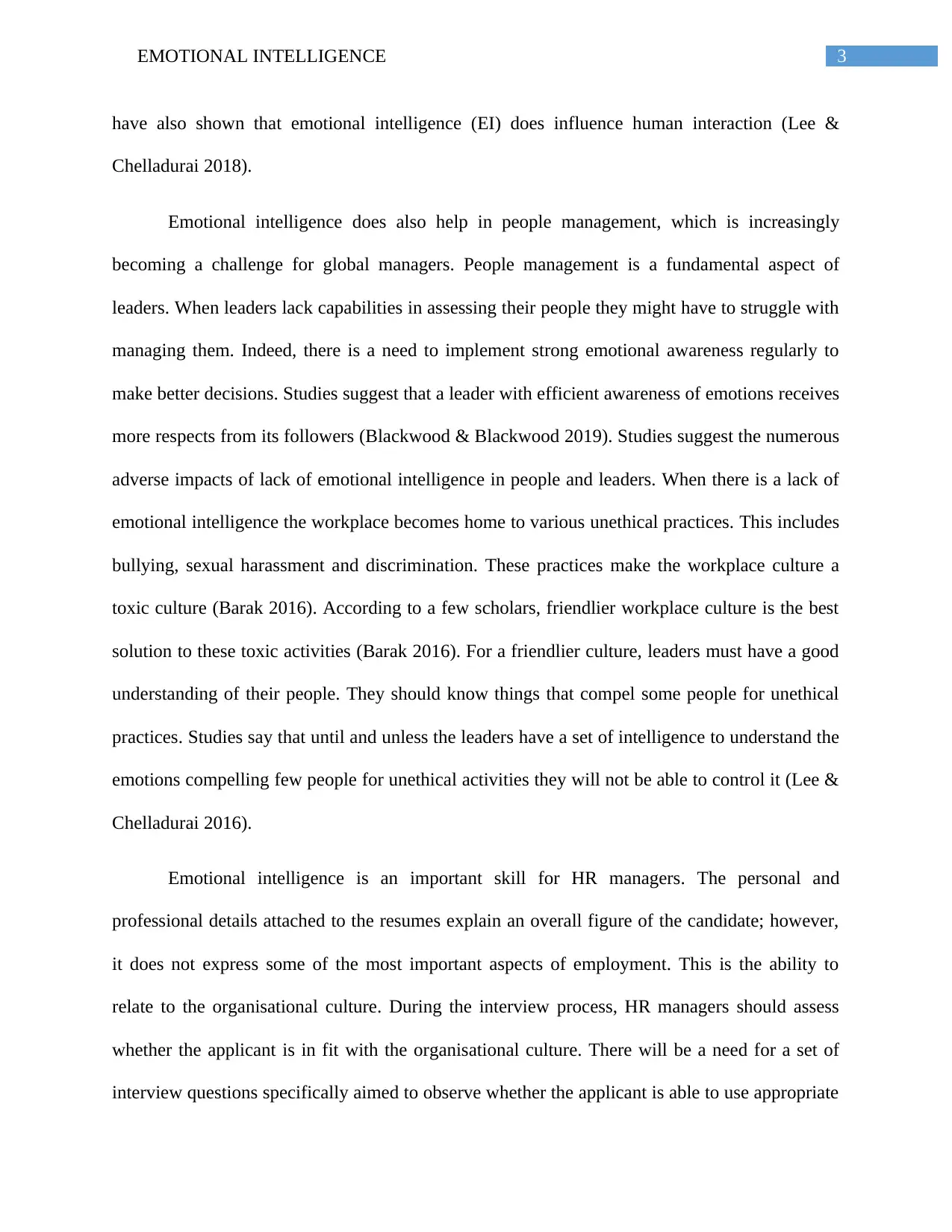
3EMOTIONAL INTELLIGENCE
have also shown that emotional intelligence (EI) does influence human interaction (Lee &
Chelladurai 2018).
Emotional intelligence does also help in people management, which is increasingly
becoming a challenge for global managers. People management is a fundamental aspect of
leaders. When leaders lack capabilities in assessing their people they might have to struggle with
managing them. Indeed, there is a need to implement strong emotional awareness regularly to
make better decisions. Studies suggest that a leader with efficient awareness of emotions receives
more respects from its followers (Blackwood & Blackwood 2019). Studies suggest the numerous
adverse impacts of lack of emotional intelligence in people and leaders. When there is a lack of
emotional intelligence the workplace becomes home to various unethical practices. This includes
bullying, sexual harassment and discrimination. These practices make the workplace culture a
toxic culture (Barak 2016). According to a few scholars, friendlier workplace culture is the best
solution to these toxic activities (Barak 2016). For a friendlier culture, leaders must have a good
understanding of their people. They should know things that compel some people for unethical
practices. Studies say that until and unless the leaders have a set of intelligence to understand the
emotions compelling few people for unethical activities they will not be able to control it (Lee &
Chelladurai 2016).
Emotional intelligence is an important skill for HR managers. The personal and
professional details attached to the resumes explain an overall figure of the candidate; however,
it does not express some of the most important aspects of employment. This is the ability to
relate to the organisational culture. During the interview process, HR managers should assess
whether the applicant is in fit with the organisational culture. There will be a need for a set of
interview questions specifically aimed to observe whether the applicant is able to use appropriate
have also shown that emotional intelligence (EI) does influence human interaction (Lee &
Chelladurai 2018).
Emotional intelligence does also help in people management, which is increasingly
becoming a challenge for global managers. People management is a fundamental aspect of
leaders. When leaders lack capabilities in assessing their people they might have to struggle with
managing them. Indeed, there is a need to implement strong emotional awareness regularly to
make better decisions. Studies suggest that a leader with efficient awareness of emotions receives
more respects from its followers (Blackwood & Blackwood 2019). Studies suggest the numerous
adverse impacts of lack of emotional intelligence in people and leaders. When there is a lack of
emotional intelligence the workplace becomes home to various unethical practices. This includes
bullying, sexual harassment and discrimination. These practices make the workplace culture a
toxic culture (Barak 2016). According to a few scholars, friendlier workplace culture is the best
solution to these toxic activities (Barak 2016). For a friendlier culture, leaders must have a good
understanding of their people. They should know things that compel some people for unethical
practices. Studies say that until and unless the leaders have a set of intelligence to understand the
emotions compelling few people for unethical activities they will not be able to control it (Lee &
Chelladurai 2016).
Emotional intelligence is an important skill for HR managers. The personal and
professional details attached to the resumes explain an overall figure of the candidate; however,
it does not express some of the most important aspects of employment. This is the ability to
relate to the organisational culture. During the interview process, HR managers should assess
whether the applicant is in fit with the organisational culture. There will be a need for a set of
interview questions specifically aimed to observe whether the applicant is able to use appropriate
Paraphrase This Document
Need a fresh take? Get an instant paraphrase of this document with our AI Paraphraser
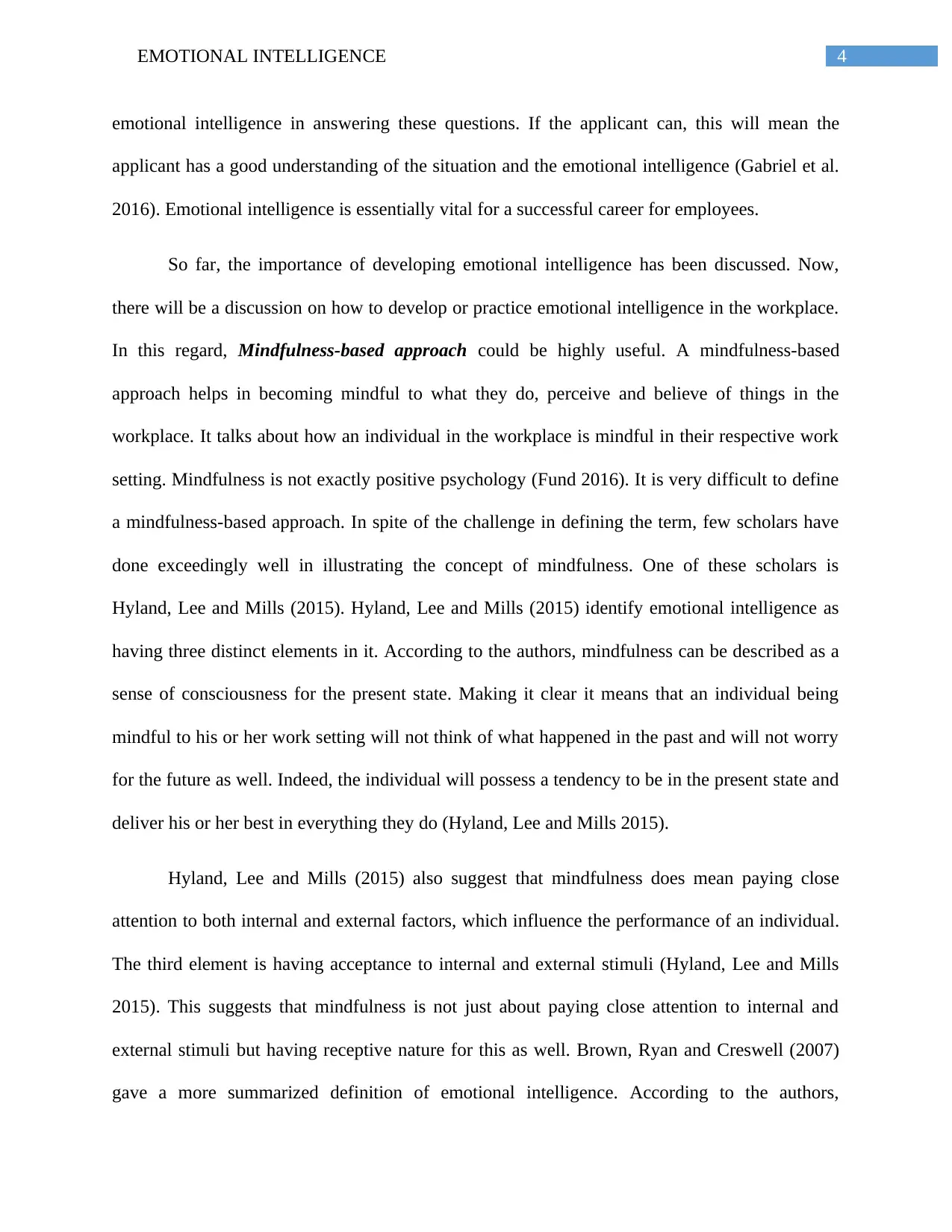
4EMOTIONAL INTELLIGENCE
emotional intelligence in answering these questions. If the applicant can, this will mean the
applicant has a good understanding of the situation and the emotional intelligence (Gabriel et al.
2016). Emotional intelligence is essentially vital for a successful career for employees.
So far, the importance of developing emotional intelligence has been discussed. Now,
there will be a discussion on how to develop or practice emotional intelligence in the workplace.
In this regard, Mindfulness-based approach could be highly useful. A mindfulness-based
approach helps in becoming mindful to what they do, perceive and believe of things in the
workplace. It talks about how an individual in the workplace is mindful in their respective work
setting. Mindfulness is not exactly positive psychology (Fund 2016). It is very difficult to define
a mindfulness-based approach. In spite of the challenge in defining the term, few scholars have
done exceedingly well in illustrating the concept of mindfulness. One of these scholars is
Hyland, Lee and Mills (2015). Hyland, Lee and Mills (2015) identify emotional intelligence as
having three distinct elements in it. According to the authors, mindfulness can be described as a
sense of consciousness for the present state. Making it clear it means that an individual being
mindful to his or her work setting will not think of what happened in the past and will not worry
for the future as well. Indeed, the individual will possess a tendency to be in the present state and
deliver his or her best in everything they do (Hyland, Lee and Mills 2015).
Hyland, Lee and Mills (2015) also suggest that mindfulness does mean paying close
attention to both internal and external factors, which influence the performance of an individual.
The third element is having acceptance to internal and external stimuli (Hyland, Lee and Mills
2015). This suggests that mindfulness is not just about paying close attention to internal and
external stimuli but having receptive nature for this as well. Brown, Ryan and Creswell (2007)
gave a more summarized definition of emotional intelligence. According to the authors,
emotional intelligence in answering these questions. If the applicant can, this will mean the
applicant has a good understanding of the situation and the emotional intelligence (Gabriel et al.
2016). Emotional intelligence is essentially vital for a successful career for employees.
So far, the importance of developing emotional intelligence has been discussed. Now,
there will be a discussion on how to develop or practice emotional intelligence in the workplace.
In this regard, Mindfulness-based approach could be highly useful. A mindfulness-based
approach helps in becoming mindful to what they do, perceive and believe of things in the
workplace. It talks about how an individual in the workplace is mindful in their respective work
setting. Mindfulness is not exactly positive psychology (Fund 2016). It is very difficult to define
a mindfulness-based approach. In spite of the challenge in defining the term, few scholars have
done exceedingly well in illustrating the concept of mindfulness. One of these scholars is
Hyland, Lee and Mills (2015). Hyland, Lee and Mills (2015) identify emotional intelligence as
having three distinct elements in it. According to the authors, mindfulness can be described as a
sense of consciousness for the present state. Making it clear it means that an individual being
mindful to his or her work setting will not think of what happened in the past and will not worry
for the future as well. Indeed, the individual will possess a tendency to be in the present state and
deliver his or her best in everything they do (Hyland, Lee and Mills 2015).
Hyland, Lee and Mills (2015) also suggest that mindfulness does mean paying close
attention to both internal and external factors, which influence the performance of an individual.
The third element is having acceptance to internal and external stimuli (Hyland, Lee and Mills
2015). This suggests that mindfulness is not just about paying close attention to internal and
external stimuli but having receptive nature for this as well. Brown, Ryan and Creswell (2007)
gave a more summarized definition of emotional intelligence. According to the authors,
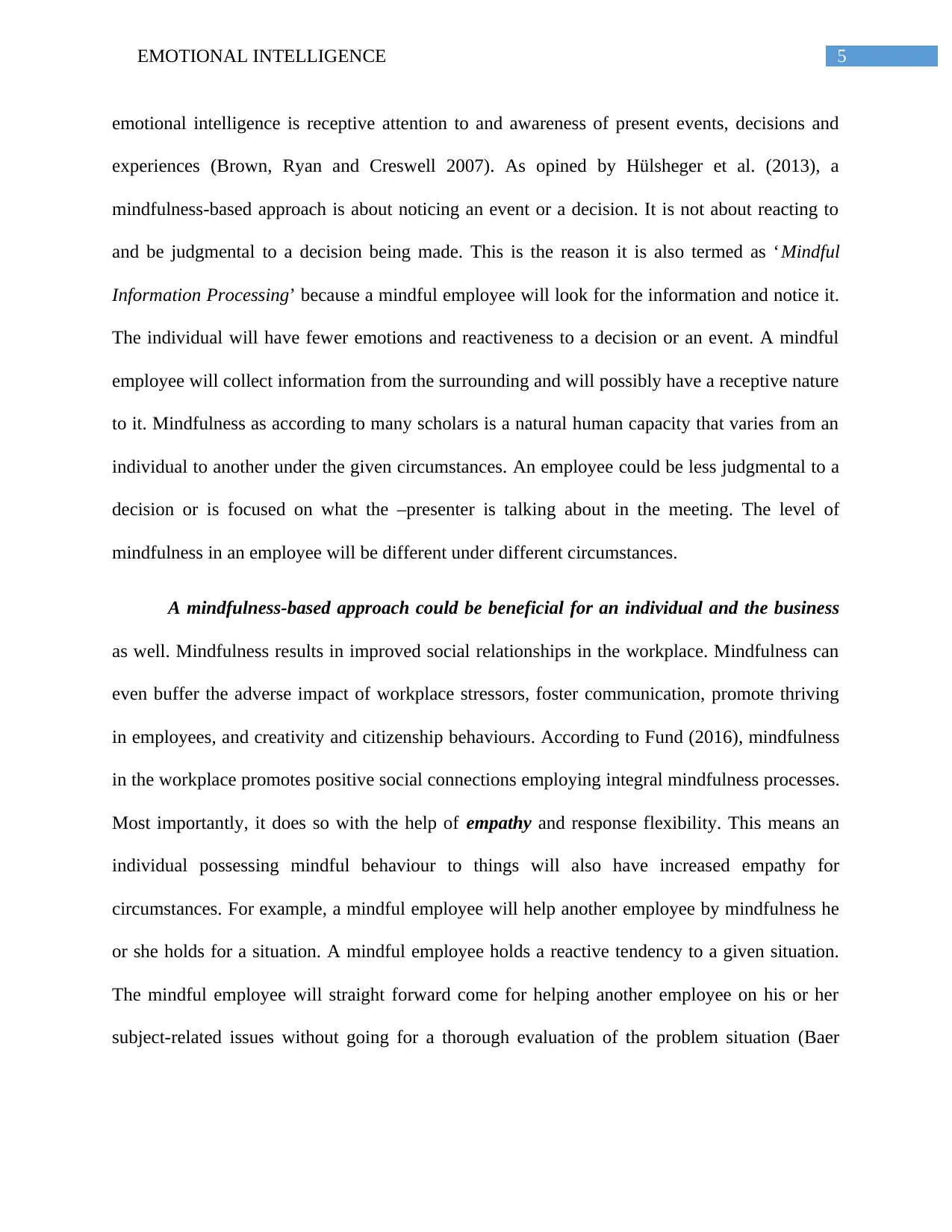
5EMOTIONAL INTELLIGENCE
emotional intelligence is receptive attention to and awareness of present events, decisions and
experiences (Brown, Ryan and Creswell 2007). As opined by Hülsheger et al. (2013), a
mindfulness-based approach is about noticing an event or a decision. It is not about reacting to
and be judgmental to a decision being made. This is the reason it is also termed as ‘Mindful
Information Processing’ because a mindful employee will look for the information and notice it.
The individual will have fewer emotions and reactiveness to a decision or an event. A mindful
employee will collect information from the surrounding and will possibly have a receptive nature
to it. Mindfulness as according to many scholars is a natural human capacity that varies from an
individual to another under the given circumstances. An employee could be less judgmental to a
decision or is focused on what the –presenter is talking about in the meeting. The level of
mindfulness in an employee will be different under different circumstances.
A mindfulness-based approach could be beneficial for an individual and the business
as well. Mindfulness results in improved social relationships in the workplace. Mindfulness can
even buffer the adverse impact of workplace stressors, foster communication, promote thriving
in employees, and creativity and citizenship behaviours. According to Fund (2016), mindfulness
in the workplace promotes positive social connections employing integral mindfulness processes.
Most importantly, it does so with the help of empathy and response flexibility. This means an
individual possessing mindful behaviour to things will also have increased empathy for
circumstances. For example, a mindful employee will help another employee by mindfulness he
or she holds for a situation. A mindful employee holds a reactive tendency to a given situation.
The mindful employee will straight forward come for helping another employee on his or her
subject-related issues without going for a thorough evaluation of the problem situation (Baer
emotional intelligence is receptive attention to and awareness of present events, decisions and
experiences (Brown, Ryan and Creswell 2007). As opined by Hülsheger et al. (2013), a
mindfulness-based approach is about noticing an event or a decision. It is not about reacting to
and be judgmental to a decision being made. This is the reason it is also termed as ‘Mindful
Information Processing’ because a mindful employee will look for the information and notice it.
The individual will have fewer emotions and reactiveness to a decision or an event. A mindful
employee will collect information from the surrounding and will possibly have a receptive nature
to it. Mindfulness as according to many scholars is a natural human capacity that varies from an
individual to another under the given circumstances. An employee could be less judgmental to a
decision or is focused on what the –presenter is talking about in the meeting. The level of
mindfulness in an employee will be different under different circumstances.
A mindfulness-based approach could be beneficial for an individual and the business
as well. Mindfulness results in improved social relationships in the workplace. Mindfulness can
even buffer the adverse impact of workplace stressors, foster communication, promote thriving
in employees, and creativity and citizenship behaviours. According to Fund (2016), mindfulness
in the workplace promotes positive social connections employing integral mindfulness processes.
Most importantly, it does so with the help of empathy and response flexibility. This means an
individual possessing mindful behaviour to things will also have increased empathy for
circumstances. For example, a mindful employee will help another employee by mindfulness he
or she holds for a situation. A mindful employee holds a reactive tendency to a given situation.
The mindful employee will straight forward come for helping another employee on his or her
subject-related issues without going for a thorough evaluation of the problem situation (Baer
⊘ This is a preview!⊘
Do you want full access?
Subscribe today to unlock all pages.

Trusted by 1+ million students worldwide
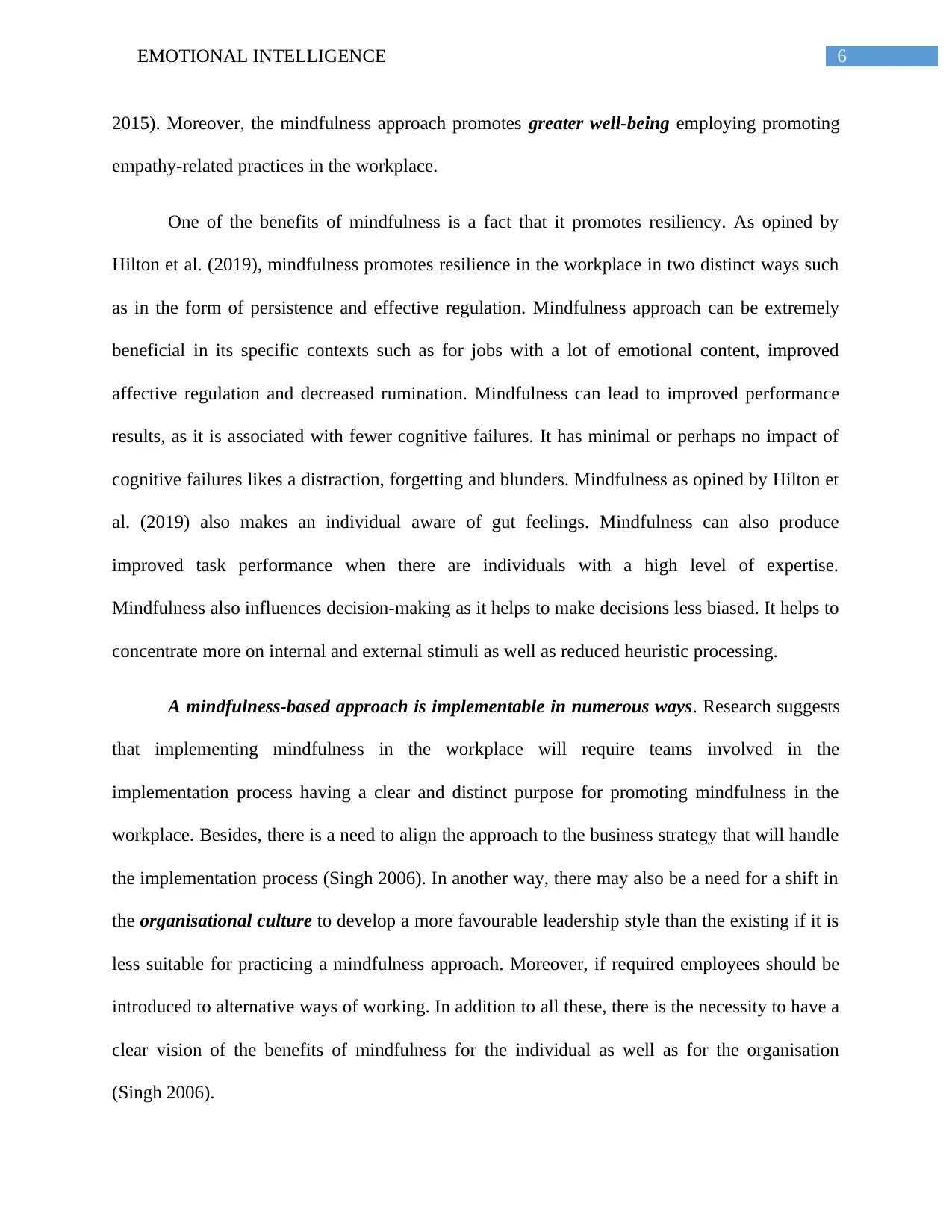
6EMOTIONAL INTELLIGENCE
2015). Moreover, the mindfulness approach promotes greater well-being employing promoting
empathy-related practices in the workplace.
One of the benefits of mindfulness is a fact that it promotes resiliency. As opined by
Hilton et al. (2019), mindfulness promotes resilience in the workplace in two distinct ways such
as in the form of persistence and effective regulation. Mindfulness approach can be extremely
beneficial in its specific contexts such as for jobs with a lot of emotional content, improved
affective regulation and decreased rumination. Mindfulness can lead to improved performance
results, as it is associated with fewer cognitive failures. It has minimal or perhaps no impact of
cognitive failures likes a distraction, forgetting and blunders. Mindfulness as opined by Hilton et
al. (2019) also makes an individual aware of gut feelings. Mindfulness can also produce
improved task performance when there are individuals with a high level of expertise.
Mindfulness also influences decision-making as it helps to make decisions less biased. It helps to
concentrate more on internal and external stimuli as well as reduced heuristic processing.
A mindfulness-based approach is implementable in numerous ways. Research suggests
that implementing mindfulness in the workplace will require teams involved in the
implementation process having a clear and distinct purpose for promoting mindfulness in the
workplace. Besides, there is a need to align the approach to the business strategy that will handle
the implementation process (Singh 2006). In another way, there may also be a need for a shift in
the organisational culture to develop a more favourable leadership style than the existing if it is
less suitable for practicing a mindfulness approach. Moreover, if required employees should be
introduced to alternative ways of working. In addition to all these, there is the necessity to have a
clear vision of the benefits of mindfulness for the individual as well as for the organisation
(Singh 2006).
2015). Moreover, the mindfulness approach promotes greater well-being employing promoting
empathy-related practices in the workplace.
One of the benefits of mindfulness is a fact that it promotes resiliency. As opined by
Hilton et al. (2019), mindfulness promotes resilience in the workplace in two distinct ways such
as in the form of persistence and effective regulation. Mindfulness approach can be extremely
beneficial in its specific contexts such as for jobs with a lot of emotional content, improved
affective regulation and decreased rumination. Mindfulness can lead to improved performance
results, as it is associated with fewer cognitive failures. It has minimal or perhaps no impact of
cognitive failures likes a distraction, forgetting and blunders. Mindfulness as opined by Hilton et
al. (2019) also makes an individual aware of gut feelings. Mindfulness can also produce
improved task performance when there are individuals with a high level of expertise.
Mindfulness also influences decision-making as it helps to make decisions less biased. It helps to
concentrate more on internal and external stimuli as well as reduced heuristic processing.
A mindfulness-based approach is implementable in numerous ways. Research suggests
that implementing mindfulness in the workplace will require teams involved in the
implementation process having a clear and distinct purpose for promoting mindfulness in the
workplace. Besides, there is a need to align the approach to the business strategy that will handle
the implementation process (Singh 2006). In another way, there may also be a need for a shift in
the organisational culture to develop a more favourable leadership style than the existing if it is
less suitable for practicing a mindfulness approach. Moreover, if required employees should be
introduced to alternative ways of working. In addition to all these, there is the necessity to have a
clear vision of the benefits of mindfulness for the individual as well as for the organisation
(Singh 2006).
Paraphrase This Document
Need a fresh take? Get an instant paraphrase of this document with our AI Paraphraser
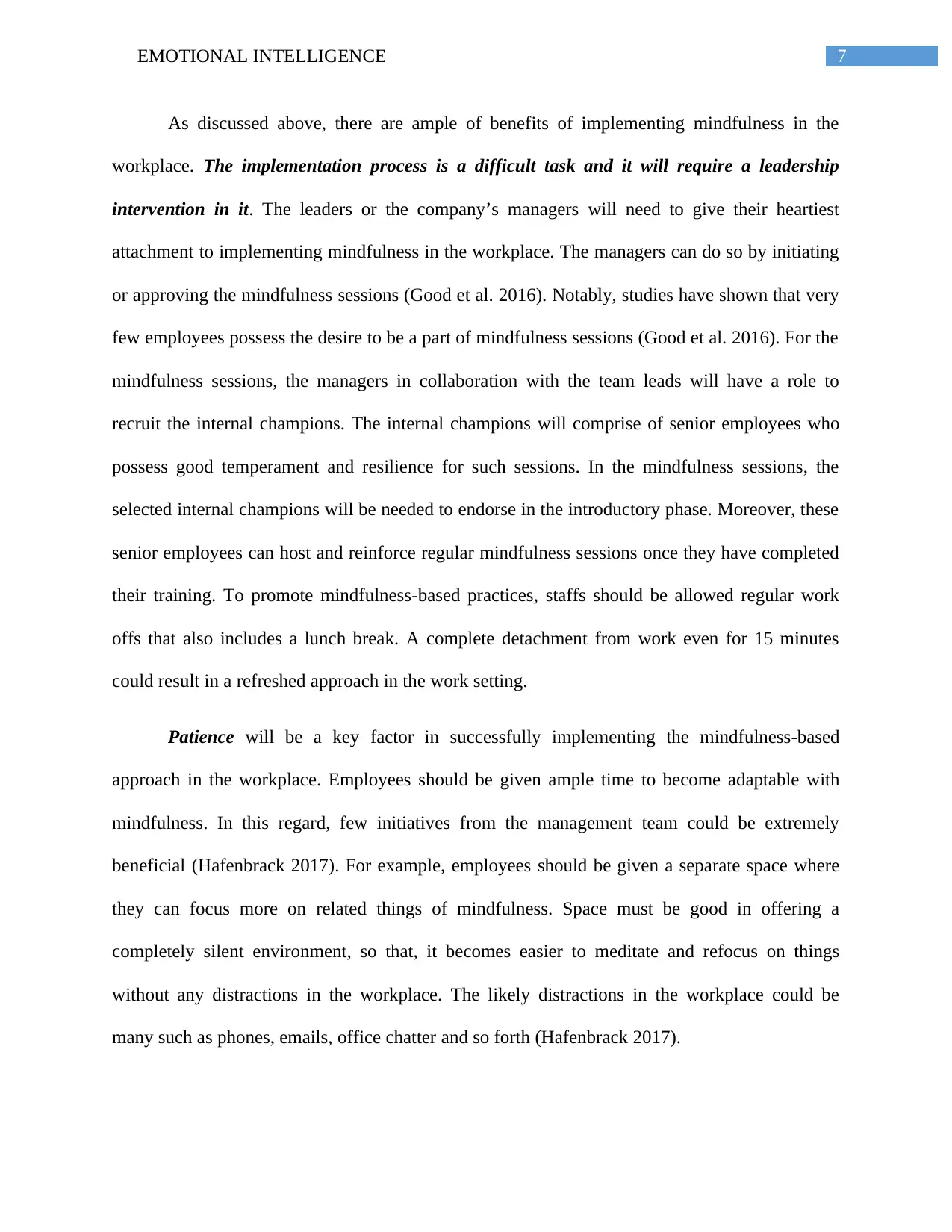
7EMOTIONAL INTELLIGENCE
As discussed above, there are ample of benefits of implementing mindfulness in the
workplace. The implementation process is a difficult task and it will require a leadership
intervention in it. The leaders or the company’s managers will need to give their heartiest
attachment to implementing mindfulness in the workplace. The managers can do so by initiating
or approving the mindfulness sessions (Good et al. 2016). Notably, studies have shown that very
few employees possess the desire to be a part of mindfulness sessions (Good et al. 2016). For the
mindfulness sessions, the managers in collaboration with the team leads will have a role to
recruit the internal champions. The internal champions will comprise of senior employees who
possess good temperament and resilience for such sessions. In the mindfulness sessions, the
selected internal champions will be needed to endorse in the introductory phase. Moreover, these
senior employees can host and reinforce regular mindfulness sessions once they have completed
their training. To promote mindfulness-based practices, staffs should be allowed regular work
offs that also includes a lunch break. A complete detachment from work even for 15 minutes
could result in a refreshed approach in the work setting.
Patience will be a key factor in successfully implementing the mindfulness-based
approach in the workplace. Employees should be given ample time to become adaptable with
mindfulness. In this regard, few initiatives from the management team could be extremely
beneficial (Hafenbrack 2017). For example, employees should be given a separate space where
they can focus more on related things of mindfulness. Space must be good in offering a
completely silent environment, so that, it becomes easier to meditate and refocus on things
without any distractions in the workplace. The likely distractions in the workplace could be
many such as phones, emails, office chatter and so forth (Hafenbrack 2017).
As discussed above, there are ample of benefits of implementing mindfulness in the
workplace. The implementation process is a difficult task and it will require a leadership
intervention in it. The leaders or the company’s managers will need to give their heartiest
attachment to implementing mindfulness in the workplace. The managers can do so by initiating
or approving the mindfulness sessions (Good et al. 2016). Notably, studies have shown that very
few employees possess the desire to be a part of mindfulness sessions (Good et al. 2016). For the
mindfulness sessions, the managers in collaboration with the team leads will have a role to
recruit the internal champions. The internal champions will comprise of senior employees who
possess good temperament and resilience for such sessions. In the mindfulness sessions, the
selected internal champions will be needed to endorse in the introductory phase. Moreover, these
senior employees can host and reinforce regular mindfulness sessions once they have completed
their training. To promote mindfulness-based practices, staffs should be allowed regular work
offs that also includes a lunch break. A complete detachment from work even for 15 minutes
could result in a refreshed approach in the work setting.
Patience will be a key factor in successfully implementing the mindfulness-based
approach in the workplace. Employees should be given ample time to become adaptable with
mindfulness. In this regard, few initiatives from the management team could be extremely
beneficial (Hafenbrack 2017). For example, employees should be given a separate space where
they can focus more on related things of mindfulness. Space must be good in offering a
completely silent environment, so that, it becomes easier to meditate and refocus on things
without any distractions in the workplace. The likely distractions in the workplace could be
many such as phones, emails, office chatter and so forth (Hafenbrack 2017).
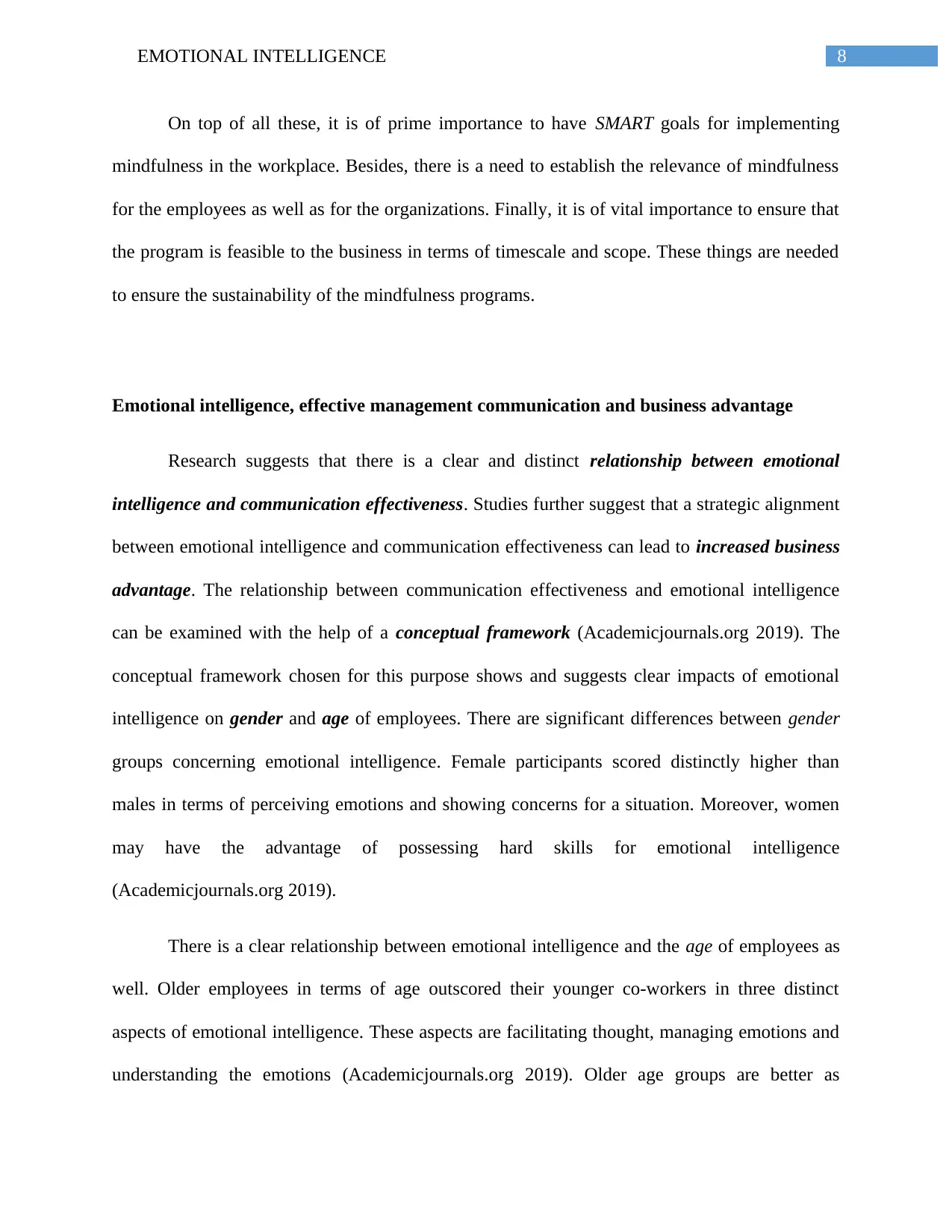
8EMOTIONAL INTELLIGENCE
On top of all these, it is of prime importance to have SMART goals for implementing
mindfulness in the workplace. Besides, there is a need to establish the relevance of mindfulness
for the employees as well as for the organizations. Finally, it is of vital importance to ensure that
the program is feasible to the business in terms of timescale and scope. These things are needed
to ensure the sustainability of the mindfulness programs.
Emotional intelligence, effective management communication and business advantage
Research suggests that there is a clear and distinct relationship between emotional
intelligence and communication effectiveness. Studies further suggest that a strategic alignment
between emotional intelligence and communication effectiveness can lead to increased business
advantage. The relationship between communication effectiveness and emotional intelligence
can be examined with the help of a conceptual framework (Academicjournals.org 2019). The
conceptual framework chosen for this purpose shows and suggests clear impacts of emotional
intelligence on gender and age of employees. There are significant differences between gender
groups concerning emotional intelligence. Female participants scored distinctly higher than
males in terms of perceiving emotions and showing concerns for a situation. Moreover, women
may have the advantage of possessing hard skills for emotional intelligence
(Academicjournals.org 2019).
There is a clear relationship between emotional intelligence and the age of employees as
well. Older employees in terms of age outscored their younger co-workers in three distinct
aspects of emotional intelligence. These aspects are facilitating thought, managing emotions and
understanding the emotions (Academicjournals.org 2019). Older age groups are better as
On top of all these, it is of prime importance to have SMART goals for implementing
mindfulness in the workplace. Besides, there is a need to establish the relevance of mindfulness
for the employees as well as for the organizations. Finally, it is of vital importance to ensure that
the program is feasible to the business in terms of timescale and scope. These things are needed
to ensure the sustainability of the mindfulness programs.
Emotional intelligence, effective management communication and business advantage
Research suggests that there is a clear and distinct relationship between emotional
intelligence and communication effectiveness. Studies further suggest that a strategic alignment
between emotional intelligence and communication effectiveness can lead to increased business
advantage. The relationship between communication effectiveness and emotional intelligence
can be examined with the help of a conceptual framework (Academicjournals.org 2019). The
conceptual framework chosen for this purpose shows and suggests clear impacts of emotional
intelligence on gender and age of employees. There are significant differences between gender
groups concerning emotional intelligence. Female participants scored distinctly higher than
males in terms of perceiving emotions and showing concerns for a situation. Moreover, women
may have the advantage of possessing hard skills for emotional intelligence
(Academicjournals.org 2019).
There is a clear relationship between emotional intelligence and the age of employees as
well. Older employees in terms of age outscored their younger co-workers in three distinct
aspects of emotional intelligence. These aspects are facilitating thought, managing emotions and
understanding the emotions (Academicjournals.org 2019). Older age groups are better as
⊘ This is a preview!⊘
Do you want full access?
Subscribe today to unlock all pages.

Trusted by 1+ million students worldwide
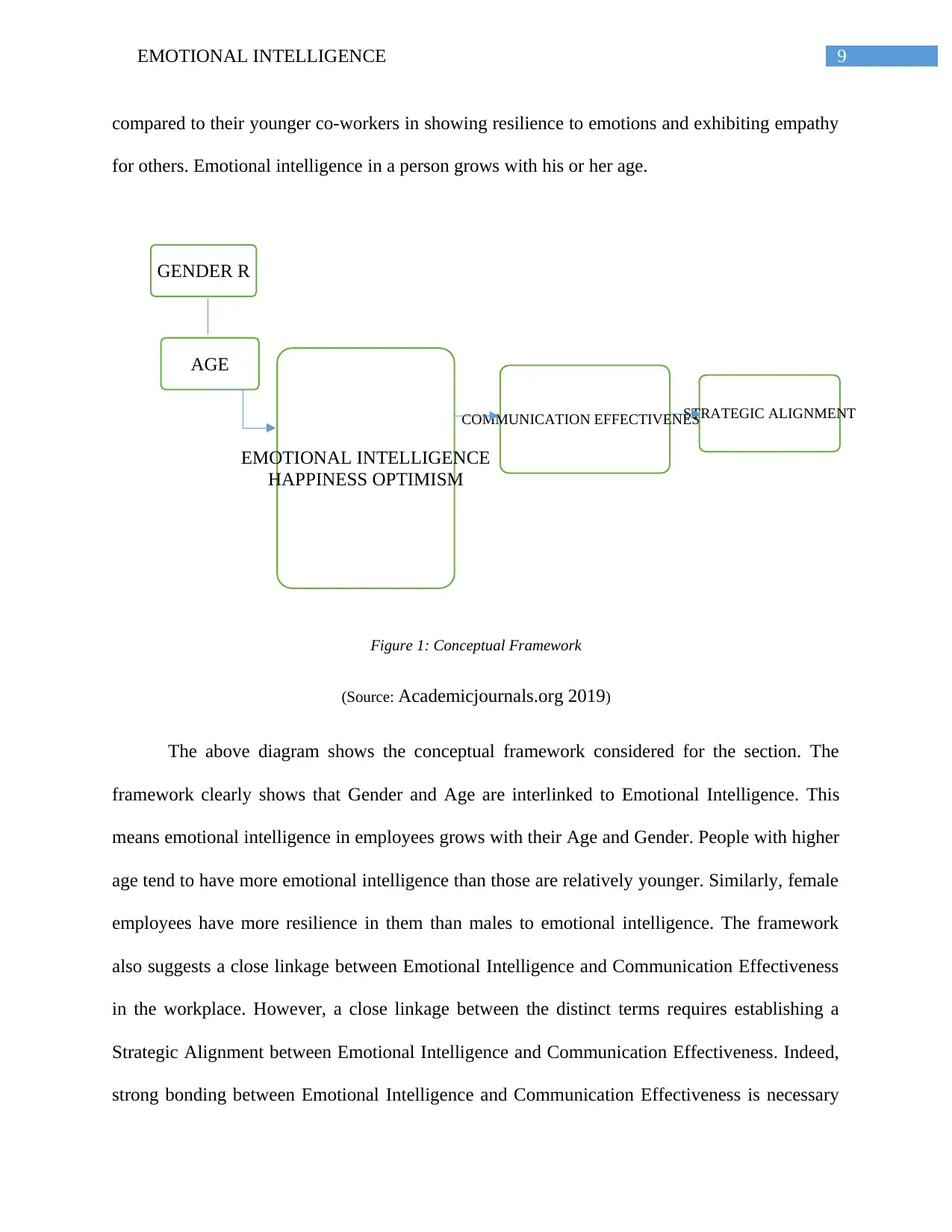
9EMOTIONAL INTELLIGENCE
GENDER R
AGE
EMOTIONAL INTELLIGENCE
HAPPINESS OPTIMISM
COMMUNICATION EFFECTIVENESSSTRATEGIC ALIGNMENT
compared to their younger co-workers in showing resilience to emotions and exhibiting empathy
for others. Emotional intelligence in a person grows with his or her age.
Figure 1: Conceptual Framework
(Source: Academicjournals.org 2019)
The above diagram shows the conceptual framework considered for the section. The
framework clearly shows that Gender and Age are interlinked to Emotional Intelligence. This
means emotional intelligence in employees grows with their Age and Gender. People with higher
age tend to have more emotional intelligence than those are relatively younger. Similarly, female
employees have more resilience in them than males to emotional intelligence. The framework
also suggests a close linkage between Emotional Intelligence and Communication Effectiveness
in the workplace. However, a close linkage between the distinct terms requires establishing a
Strategic Alignment between Emotional Intelligence and Communication Effectiveness. Indeed,
strong bonding between Emotional Intelligence and Communication Effectiveness is necessary
GENDER R
AGE
EMOTIONAL INTELLIGENCE
HAPPINESS OPTIMISM
COMMUNICATION EFFECTIVENESSSTRATEGIC ALIGNMENT
compared to their younger co-workers in showing resilience to emotions and exhibiting empathy
for others. Emotional intelligence in a person grows with his or her age.
Figure 1: Conceptual Framework
(Source: Academicjournals.org 2019)
The above diagram shows the conceptual framework considered for the section. The
framework clearly shows that Gender and Age are interlinked to Emotional Intelligence. This
means emotional intelligence in employees grows with their Age and Gender. People with higher
age tend to have more emotional intelligence than those are relatively younger. Similarly, female
employees have more resilience in them than males to emotional intelligence. The framework
also suggests a close linkage between Emotional Intelligence and Communication Effectiveness
in the workplace. However, a close linkage between the distinct terms requires establishing a
Strategic Alignment between Emotional Intelligence and Communication Effectiveness. Indeed,
strong bonding between Emotional Intelligence and Communication Effectiveness is necessary
Paraphrase This Document
Need a fresh take? Get an instant paraphrase of this document with our AI Paraphraser
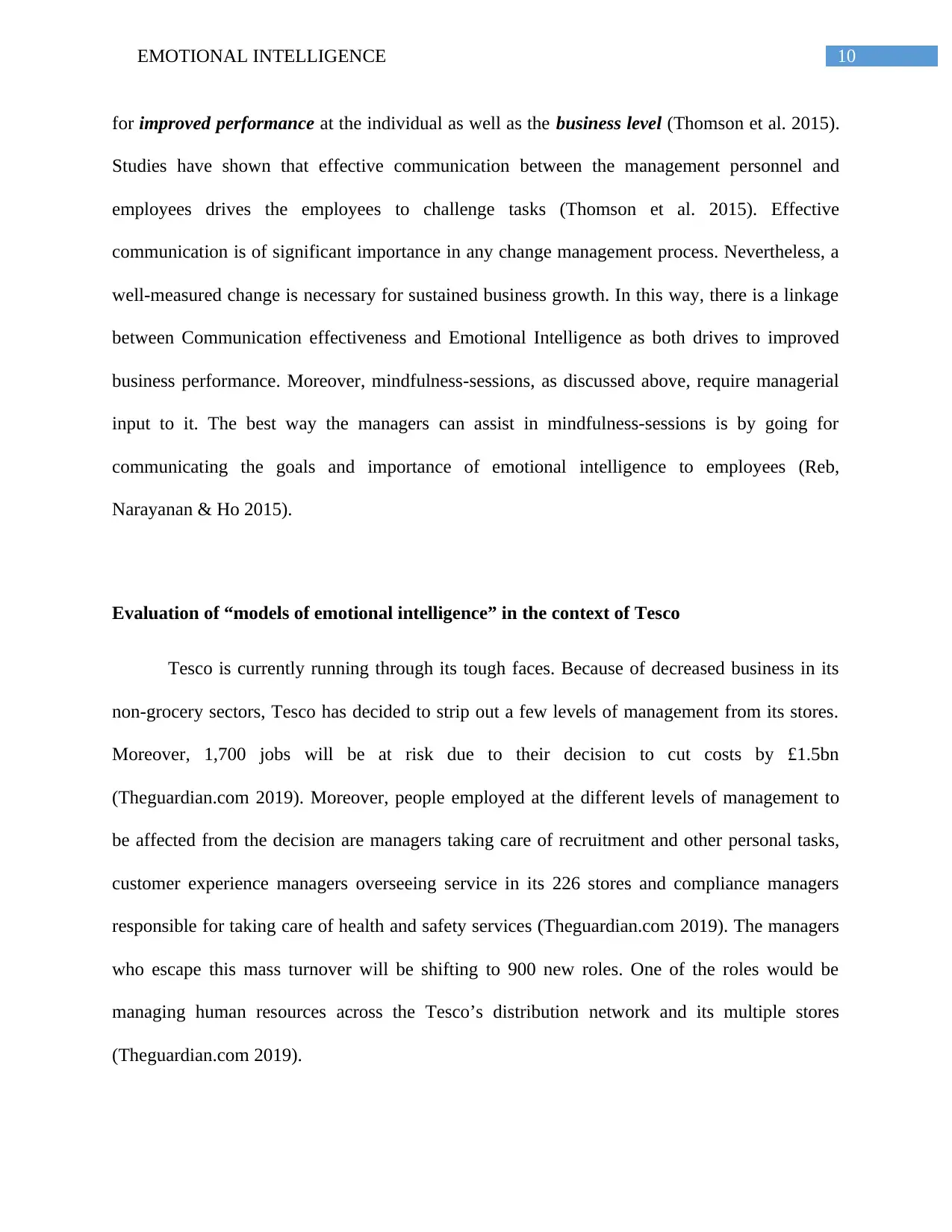
10EMOTIONAL INTELLIGENCE
for improved performance at the individual as well as the business level (Thomson et al. 2015).
Studies have shown that effective communication between the management personnel and
employees drives the employees to challenge tasks (Thomson et al. 2015). Effective
communication is of significant importance in any change management process. Nevertheless, a
well-measured change is necessary for sustained business growth. In this way, there is a linkage
between Communication effectiveness and Emotional Intelligence as both drives to improved
business performance. Moreover, mindfulness-sessions, as discussed above, require managerial
input to it. The best way the managers can assist in mindfulness-sessions is by going for
communicating the goals and importance of emotional intelligence to employees (Reb,
Narayanan & Ho 2015).
Evaluation of “models of emotional intelligence” in the context of Tesco
Tesco is currently running through its tough faces. Because of decreased business in its
non-grocery sectors, Tesco has decided to strip out a few levels of management from its stores.
Moreover, 1,700 jobs will be at risk due to their decision to cut costs by £1.5bn
(Theguardian.com 2019). Moreover, people employed at the different levels of management to
be affected from the decision are managers taking care of recruitment and other personal tasks,
customer experience managers overseeing service in its 226 stores and compliance managers
responsible for taking care of health and safety services (Theguardian.com 2019). The managers
who escape this mass turnover will be shifting to 900 new roles. One of the roles would be
managing human resources across the Tesco’s distribution network and its multiple stores
(Theguardian.com 2019).
for improved performance at the individual as well as the business level (Thomson et al. 2015).
Studies have shown that effective communication between the management personnel and
employees drives the employees to challenge tasks (Thomson et al. 2015). Effective
communication is of significant importance in any change management process. Nevertheless, a
well-measured change is necessary for sustained business growth. In this way, there is a linkage
between Communication effectiveness and Emotional Intelligence as both drives to improved
business performance. Moreover, mindfulness-sessions, as discussed above, require managerial
input to it. The best way the managers can assist in mindfulness-sessions is by going for
communicating the goals and importance of emotional intelligence to employees (Reb,
Narayanan & Ho 2015).
Evaluation of “models of emotional intelligence” in the context of Tesco
Tesco is currently running through its tough faces. Because of decreased business in its
non-grocery sectors, Tesco has decided to strip out a few levels of management from its stores.
Moreover, 1,700 jobs will be at risk due to their decision to cut costs by £1.5bn
(Theguardian.com 2019). Moreover, people employed at the different levels of management to
be affected from the decision are managers taking care of recruitment and other personal tasks,
customer experience managers overseeing service in its 226 stores and compliance managers
responsible for taking care of health and safety services (Theguardian.com 2019). The managers
who escape this mass turnover will be shifting to 900 new roles. One of the roles would be
managing human resources across the Tesco’s distribution network and its multiple stores
(Theguardian.com 2019).
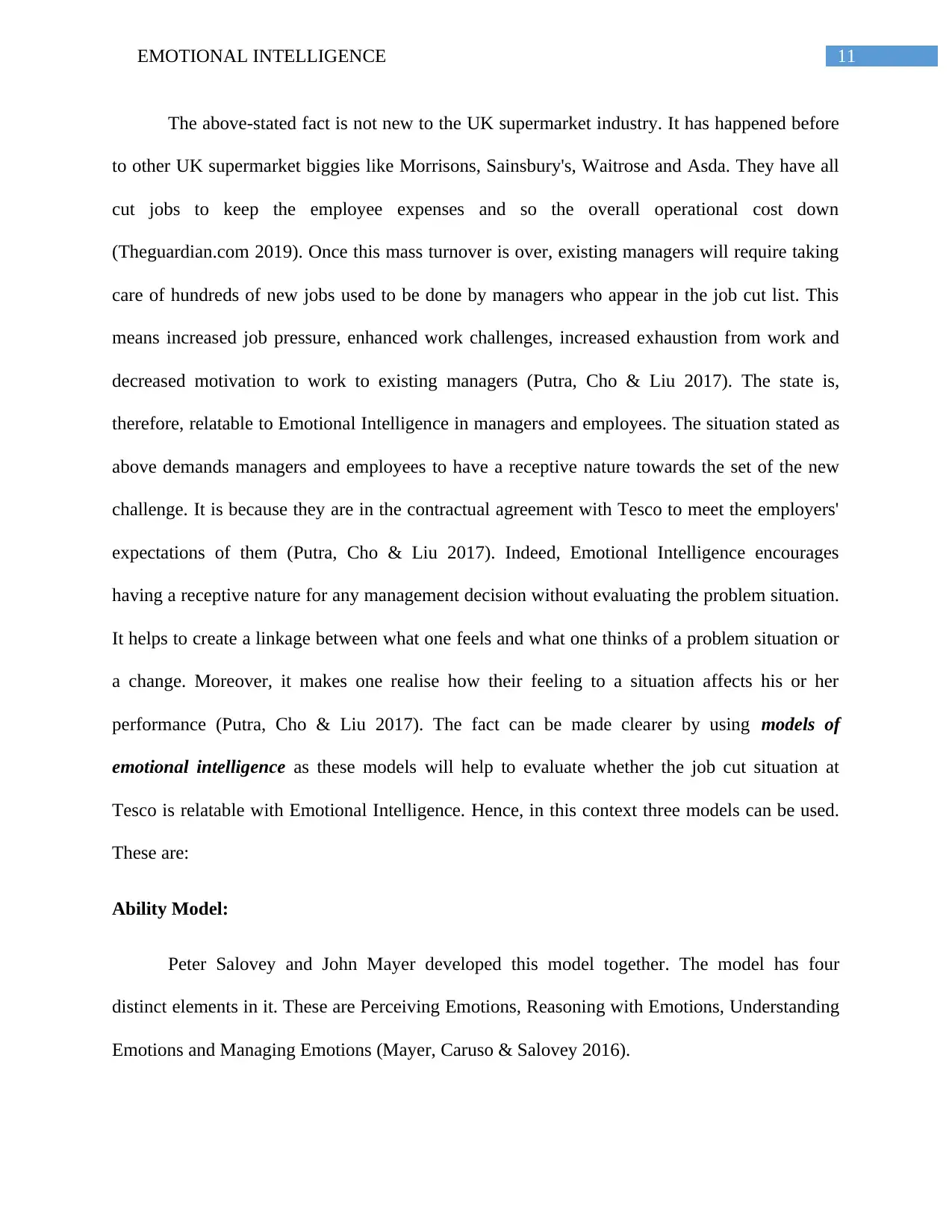
11EMOTIONAL INTELLIGENCE
The above-stated fact is not new to the UK supermarket industry. It has happened before
to other UK supermarket biggies like Morrisons, Sainsbury's, Waitrose and Asda. They have all
cut jobs to keep the employee expenses and so the overall operational cost down
(Theguardian.com 2019). Once this mass turnover is over, existing managers will require taking
care of hundreds of new jobs used to be done by managers who appear in the job cut list. This
means increased job pressure, enhanced work challenges, increased exhaustion from work and
decreased motivation to work to existing managers (Putra, Cho & Liu 2017). The state is,
therefore, relatable to Emotional Intelligence in managers and employees. The situation stated as
above demands managers and employees to have a receptive nature towards the set of the new
challenge. It is because they are in the contractual agreement with Tesco to meet the employers'
expectations of them (Putra, Cho & Liu 2017). Indeed, Emotional Intelligence encourages
having a receptive nature for any management decision without evaluating the problem situation.
It helps to create a linkage between what one feels and what one thinks of a problem situation or
a change. Moreover, it makes one realise how their feeling to a situation affects his or her
performance (Putra, Cho & Liu 2017). The fact can be made clearer by using models of
emotional intelligence as these models will help to evaluate whether the job cut situation at
Tesco is relatable with Emotional Intelligence. Hence, in this context three models can be used.
These are:
Ability Model:
Peter Salovey and John Mayer developed this model together. The model has four
distinct elements in it. These are Perceiving Emotions, Reasoning with Emotions, Understanding
Emotions and Managing Emotions (Mayer, Caruso & Salovey 2016).
The above-stated fact is not new to the UK supermarket industry. It has happened before
to other UK supermarket biggies like Morrisons, Sainsbury's, Waitrose and Asda. They have all
cut jobs to keep the employee expenses and so the overall operational cost down
(Theguardian.com 2019). Once this mass turnover is over, existing managers will require taking
care of hundreds of new jobs used to be done by managers who appear in the job cut list. This
means increased job pressure, enhanced work challenges, increased exhaustion from work and
decreased motivation to work to existing managers (Putra, Cho & Liu 2017). The state is,
therefore, relatable to Emotional Intelligence in managers and employees. The situation stated as
above demands managers and employees to have a receptive nature towards the set of the new
challenge. It is because they are in the contractual agreement with Tesco to meet the employers'
expectations of them (Putra, Cho & Liu 2017). Indeed, Emotional Intelligence encourages
having a receptive nature for any management decision without evaluating the problem situation.
It helps to create a linkage between what one feels and what one thinks of a problem situation or
a change. Moreover, it makes one realise how their feeling to a situation affects his or her
performance (Putra, Cho & Liu 2017). The fact can be made clearer by using models of
emotional intelligence as these models will help to evaluate whether the job cut situation at
Tesco is relatable with Emotional Intelligence. Hence, in this context three models can be used.
These are:
Ability Model:
Peter Salovey and John Mayer developed this model together. The model has four
distinct elements in it. These are Perceiving Emotions, Reasoning with Emotions, Understanding
Emotions and Managing Emotions (Mayer, Caruso & Salovey 2016).
⊘ This is a preview!⊘
Do you want full access?
Subscribe today to unlock all pages.

Trusted by 1+ million students worldwide
1 out of 25
Related Documents
Your All-in-One AI-Powered Toolkit for Academic Success.
+13062052269
info@desklib.com
Available 24*7 on WhatsApp / Email
![[object Object]](/_next/static/media/star-bottom.7253800d.svg)
Unlock your academic potential
Copyright © 2020–2026 A2Z Services. All Rights Reserved. Developed and managed by ZUCOL.




